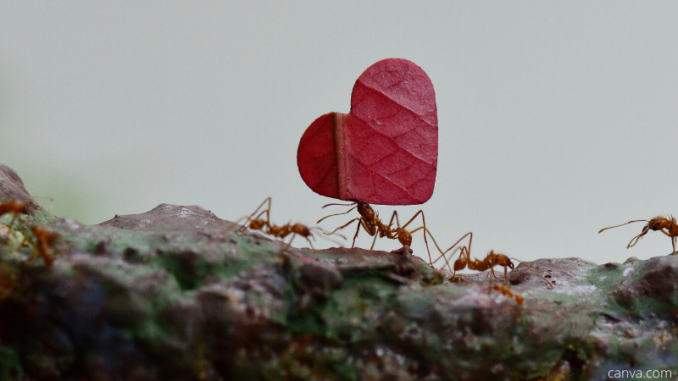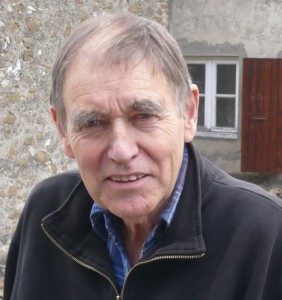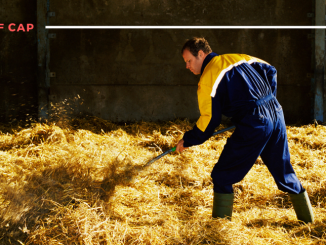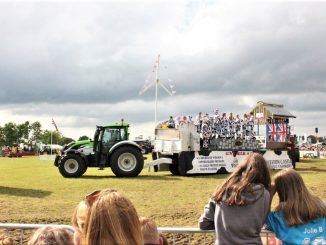 “Wake Up” by The Bone Collector II is licensed under CC BY-NC-ND 2.0
“Wake Up” by The Bone Collector II is licensed under CC BY-NC-ND 2.0
Sjoerd Wartena first went “back to nature” almost half a century ago. In this letter to the younger generation he reflects on our relationship with nature and the land, the importance of modelling change, and the role of humility and compassion in giving humanity a second chance.
For me, you belong to the generation that is obliged to find a different way of life. A way of life that tends towards what we call here in France the Social and Solidarity Economy. A way of life that can lead to “internal ecology”, that goes beyond the “external ecology” of recycling and reducing water and paper consumption – let alone energy-sucking digital systems, and the endless kilometres driven by electric cars that increasingly run on coal and oil-generated electricity.
On the contrary of what a lot of people want us to believe, we will not find an outcome of the ecological crisis only by political and economic reform, ethical charters, technological advance or daily eco-gestures. As encompassing as they may be, external ecology is not sufficient. It has to be complemented by internal ecology.
Note that there is no mention of the loaded word “spiritual”. Edgar Morin calls this “metamorphosis”.
Social and Solidarity Economy (SSE) is a term that is often misappropriated by so-called cooperative banks (eg RABO in the Netherlands or in France the Crédit Agricole) and huge, internationally operating agricultural cooperatives (Campina!). Yet if you take the concept further and restrict salaries, shares, reinvestment of profits and purposes of production, you arrive at a completely different, less capitalist, society.
This ecological metamorphosis is not easy to achieve. There is a long list of examples all over the world, but it is a fragmented landscape. Existing examples often stand alone or are housed in different organizations that communicate poorly with each other. Many streams but no river! And it is a minority. Most people are either not open to or have never heard about it.
What modern man is finally losing or has renounced is his transcendental baggage, which – if not containing a certain concept of God – still does have a sense of or intuition for infinity and human doubt. (A good book about this is “The Perennial Philosophy” by Aldous Huxley, which I think belongs in every library.)
In my opinion, you need also a healthy mistrust of the word “reasonable”. Don’t trust your brain!
Perhaps baggage is not the right word; it is more of a doppelganger who has been lost, a half who is gone and replaced by enjoyment, wellness, Facebook friends and “don’t make things too complicated”. Individuality is part of this. The principle of teacher and disciple, the Zen master, has disappeared entirely. I can think for myself. You usually can’t, but the humility of the disciple is now inconceivable and teachers are not easy to find.
Much was written on this in the early 20th century: Ortega Y Gasset’s “The Revolt of the Hurdles”, Huizinga’s “In the Shadow of Tomorrow”, Huxley’s “Brave New World”, and countless other works of far-sighted literature are still very up to date.
In 1973, when Liek and I decided to change course and start a goat farm in France with friends, all these uncertainties, doubts, questions were already in the air. They were reflected in Provo, the Maagdenhuis occupation in Amsterdam, Paris ’68, Flower Power and the simultaneous anti-Vietnam and Black Panther movements in the USA. The “back to nature” utopia was also part of it.
We wanted to see what that “back to nature” really meant and could handle the risk of a possible failure and return. There was plenty of work, we had earned some money, and an inheritance allowed us to buy a farmhouse for habbekrats (a pittance) and learn for the first few years as we tried to master the new way of life. You could call it a gentle metamorphosis – not to underestimate the challenge!
In the place finally chosen here in Vachères-en-Quint in La Drôme, France, we found a traditional culture passed on from one generation to the next. The older generation taught their children how to survive on and from the land, and the next generation made only modest changes. This had been the case since time immemorial. It is amazing to read in the famous book by Emmanuel Le Roy Ladurie, “Montaillou, village occitan de 1294 à 1324”, how the world of the old French country village is recognisable in what we found here in Vachères and the valley beyond.
But by the 1970s the new age had driven out the younger generation, and the elderly were left as the last remnants of a culture that had practically disappeared.
Because of our contact with this older generation and the transfer of knowledge (teacher and disciple!), it began to dawn on us that man of the modern age had jumped around very messily with his predecessors. Of course, their practically autarkic lifestyle, their mule, eventually replaced by a two-wheel drive utility tractor, their simple plastic-covered kitchen table, the only tiny tap above a miniscule sink where everything had to be washed, milk cans, underpants, face, vegetables (their stable was the WC), all this belonged not in the present day. The children had left for the city or more prosperous regions and only a few fields, not too steep, were enough for the 5 cows and 30 goats, the milk of which was sold to the cooperative.
But this life in a small village, in a sharp ravine intersected, steep hilly landscape, few springs, where in 1850 more than 100 people lived and survived, required a lot of inventiveness and labor-intensive adjustments such as roads, terraces, irrigation rigs, remote sheds to spend the night with the animals or to store tools and harvest. Rarely travelling, but, judging by the stories, even regularly, walking to neighbouring villages for parties (vogues), weddings, markets and barter.
Solving those problems, using and working the terrain at its most favorable, making optimal use of the spare presence of water, making the most of all that the meagre nature has produced, creates an agri-“culture”.
We could just about register that culture, learn from it and adjust it here and there to our own time with better machines, different ideas about processing and selling and with more knowledge of the world outside the village. So much did the older generation know about nature; they knew their own area in detail and they were at home in many skills. Apart from navigating hilly landscapes, they could also lay bricks, weave baskets, transport wood down cables, slaughter, bake bread, make cheese, grow and process linen and hemp fibres, make wine, press nut oil and lavender oil, distill schnapps, hunt, fish in the smallest streams, and later weld and repair machines, and sometimes make shoes, furniture and carts.
If you see nowadays, especially during the Corona pandemic, how many versatile businesses and companies are emerging, the similarities with our illustrious predecessors are striking. You can understand why we have started to see it as our task to make our metamorphosis a more general objective. The diversified, small-scale or cooperatively organized rural business can play an important role in tackling many problems of our time, inspired by the older generations.
In short, not only misery, doom and gloom, but also a varied, intensive and heavy existence in a limited space and with attention to detail and… again the realisation of being a link in an eternal chain. As it once was, and will be again one day.

Second chance
Could these lessons offer a source of inspiration, a second chance?
Inuit specialist Jean Malaurie, when asked why research into the customs and culture of the Inuit and other indigenous peoples is so important, said: “It’s about our life! I am convinced that these minorities, which have always been considered a “quantité négligeable” in Western thinking, are destined to one day play a leading role. The views and customs of their world may represent a second chance for humanity. These peoples have retained a vital line and an exceptional sense of nature, which we have lost since the Neolithic period and which has been a great loss for us ever since.” (Interview with French magazine Télérama, August 2020).
This is in line with our conclusions after getting acquainted with the old agricultural “culture” of the original population in our village. They too had preserved that relationship with nature, told traditions and stories (often in the regional patois) with a great knowledge of their natural environment and history. That is where the comparison ends, because Christianity and the whole of Western history has of course left a heavy mark and restrained the collective and nomad culture.
First you must work out your own example and then you can hope that it will encourage allies to do the same. You can also look for similar conclusions elsewhere. Rarely are you alone in your initiative. The zeitgeist governs and influences other people simultaneously and in different ways.
In my case, I reformulated these ideas for years and tried to find political, institutional or individual allies. We visited the green fund of the Triodos bank in the Netherlands, the Land Heritage foundation (“If land could speak it should cry out for help”!). And I wrote letters to MPs, the French semi-government foundation Fondation de France and numerous potential “co-conspirators”.
Ultimately, these efforts were successful in France with the emergence of Terre de Liens, which is now at the basis of a European working group, Access to Land, which holds that land access is an absolute precondition for change in European agricultural policy. This organization unites a number of initiatives in different European countries working on access to land for community connected farming, and is endeavouring to form a strong coalition in Brussels to find political support for this theme. The newest partners in the Netherlands are the Grondbeheer and Herenboeren foundations, which are united in the organization Aardpeer.
The why of all these activities should be found in the culture of passing on to the next generation and the social and solidarity economy. These stand in sharp contrast to the wildly developing digital culture, smartphone syndrome, the climate-changing consumer society, tech giants, the robotised and trapped Chinese robot society, the expansion of tourism – now stopped by Corona – to one of the world’s major economic activities (read “Brave New World”) and so on. As John McMurthry called his book, the cancer stage of capitalism!
Through our own metamorphosis we have experienced firsthand what it means to work with plants and animals. An influence that is recognisable in many similar initiatives, near and far. For example, there is the French Charter for peasant agriculture, there is no need for world trade, although from time to time you can very well make something in a special area that is not possible to make elsewhere. Take the example of vanilla or bananas. Unfortunately, however, local food production is then often neglected and people start to live from the surpluses of the world market.

Shift in mentality
As I said above, the sine qua non for tackling the major social and human problems is a shift to what I cautiously call a different mentality. For me, that is a spiritual search. God means seeking God.
The word God (with a capital “G”!) alone can provoke violent reactions or a devastating shrug of the shoulders. The same goes for the Gospel, if people already know what that means, but from which we still get many of our remaining basic rules of life. So, as I said, it needs to be handled with precaution. Everything around us counteracts such a reflective and cooperative attitude. It is practically impossible to be self-effacing in a performance culture focused on efficiency, smartness and competition. The first lesson is: “Don’t let people walk all over you.” I prefer to ask: “Do you know what compassion is?”
How can you think through a thought and let it sink in with the ceaseless chatter of distractions, images, apps, entertainment, and name it whatever you want machine in hand?
When I look initiatives near and far – small-scale or cooperative rural enterprises, often mixing food production with social or artisanal activities – they seem to share a number of conditions that contribute to a shift in mentality. Of course these initiatives have their downsides. Here too, the smartphone is indispensable, the whole of Africa runs around with it. Again, you should not usually come up with the Gospel and if that is welcome, you often have to deal with a bigoted group. Here too there is a lot of turnover, divorces, political Prinzipienreiterei, lack of knowledge, jealousy or dreaming. Nevertheless, it also creates a climate where working with nature leaves an influence, with less greed and less world market thinking; more social, with more solidarity.
There is a wealth of literature on this and especially a wealth of good examples. Forging all this into an efficient movement that can enter into “competition” on an equal footing – not with the “greedy” crooks who stash their billions in the Caribbean, but with those who believe in the human brain that can solve everything – is not easy or even likely. The latter “ecomodernists” think that fast, energetic start-ups can solve all problems and they see an opportunity in achieving never-ending, feverish progress and growth for profit and prosperity. As long as you invest!
The hope is not great and the chaos of a climate disaster or the current Covid-19 pandemic is not a desirable image for the future. We continue to produce different examples of how the future can look and we continue to try to bring together the different components of a more social and more solidarity-based movement. There is not much else to do. Join.
Kind regards, Sjoerd
August 3, 2020
Look out for a follow-up letter from Sjoerd Wartena in the New Year, when he will explore agro-archaeology in Vachères and the remnants of a vanishing agri-“culture”.
More on France
Rural Dialogues | Intergenerational Collaboration in the Vineyards of Southern France
State-Sanctioned Agroecological Transition? The State of Food in France






